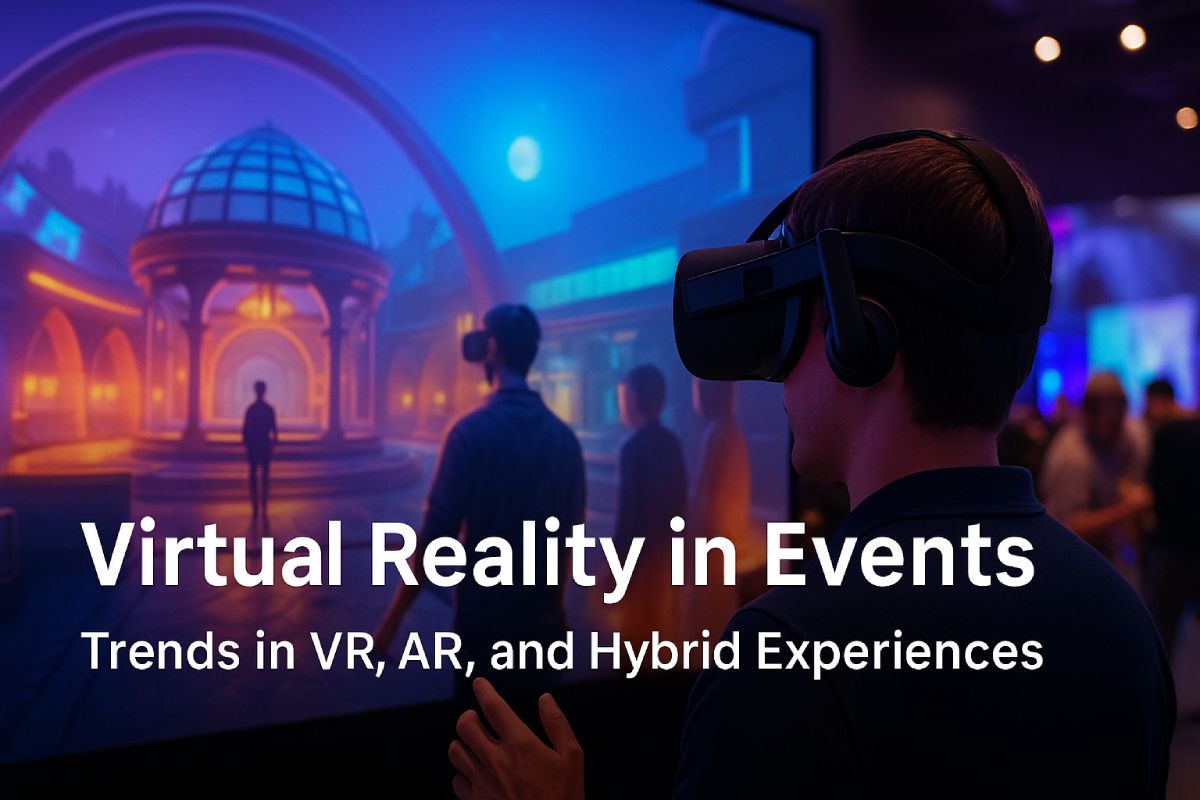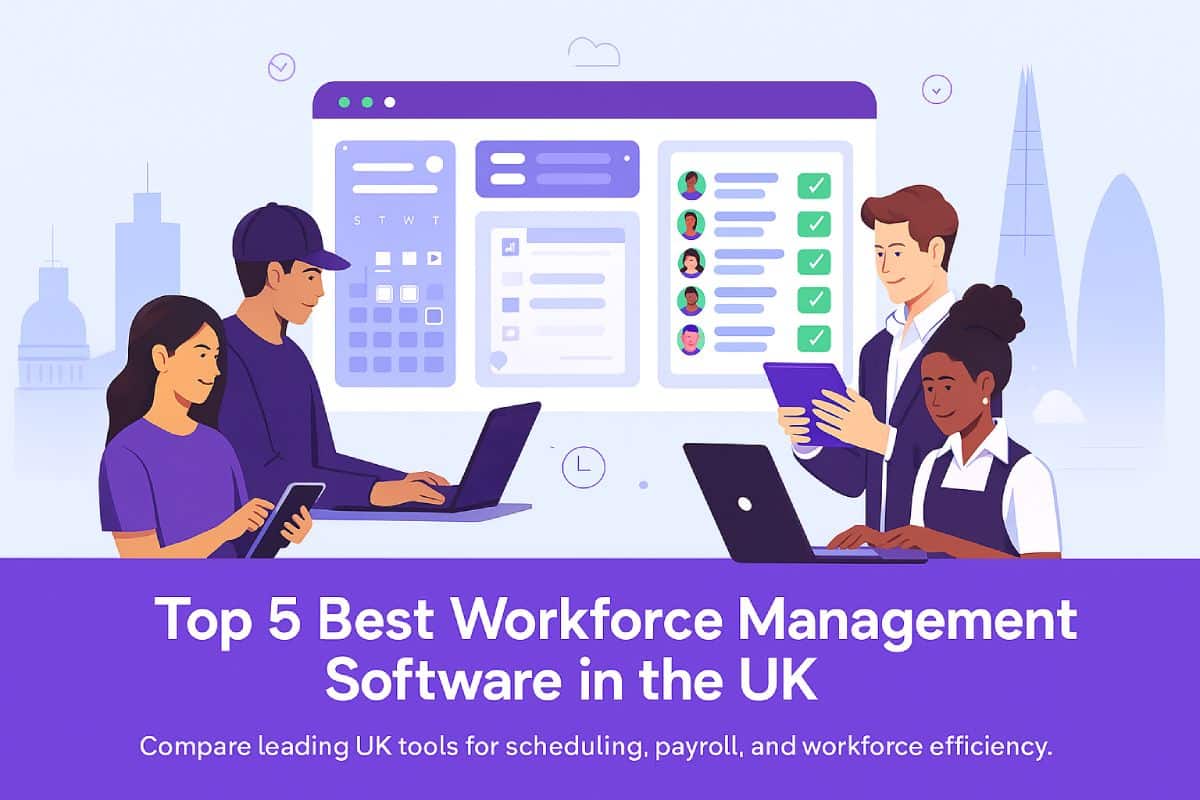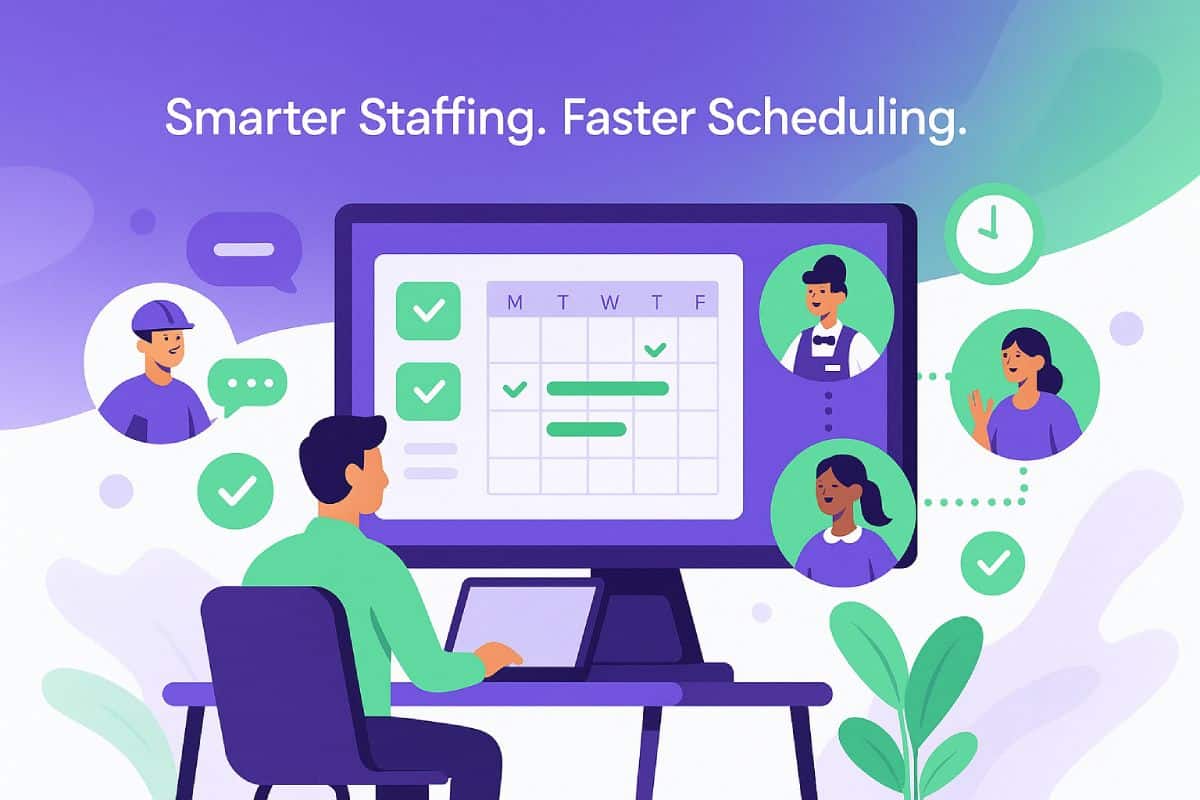Standing out in today’s crowded events industry has never been harder. Attendees expect experiences that are interactive, memorable, and often digital-first.
That’s where Virtual Reality (VR), Augmented Reality (AR), and hybrid events are transforming the landscape. From fully immersive VR product demos to AR-enhanced networking, these technologies are no longer a novelty; they’re quickly becoming the standard for engaging modern audiences and maximizing ROI.
This guide examines the role of virtual reality in events, the emergence of AR, and how hybrid formats are transforming the industry. We’ll also examine the implications of these trends for staffing, how event agencies can adapt, and the benefits of utilizing tools like event staffing software to support growth.
The Rise of VR, AR, and Hybrid Events

Virtual Reality (VR) Events
Virtual reality in events has revolutionised audience engagement. From fully immersive 360-degree product launches to training simulations and live concerts, VR allows attendees to experience an event from anywhere in the world. For organisers, VR events create opportunities to:
- Reach global audiences without physical limitations.
- Offer personalised experiences through VR content for events.
- Deliver higher levels of interactivity and engagement.
Today, VR events are particularly popular for conferences, trade shows, and corporate training sessions where interaction and simulation are critical.
As technology continues to advance, VR events are expected to become a standard part of conferences, exhibitions, and even entertainment festivals.
Augmented Reality (AR) Events
Unlike VR, augmented reality events enhance real-world experiences by overlaying digital elements. AR is increasingly used at exhibitions, brand activations, and hybrid meetings to:
- Provide live product demonstrations.
- Enhance networking opportunities with AR-driven apps.
- Make presentations more dynamic and interactive.
Whether it’s using augmented reality at events to create immersive product showcases or enhancing workshops, AR has become a powerful tool for increasing participation and memorability.
More brands are experimenting with augmented reality events to deliver product showcases that merge digital storytelling with real-world interaction.
Hybrid Events and Their Growing Importance
Among the latest hybrid events trends, organisers are increasingly combining in-person formats with virtual platforms, often enhanced by AR and VR technology.
These events blend in-person attendance with virtual participation, offering flexibility and broader reach.
Benefits of hybrid formats include:
- Access for attendees who cannot travel.
- Greater scalability and cost-effectiveness.
- Improved sustainability by reducing travel emissions.
As the industry grows, staffing agencies and organisers must adapt to manage both in-person and digital components simultaneously.
How AR and VR Are Shaping the Events Industry
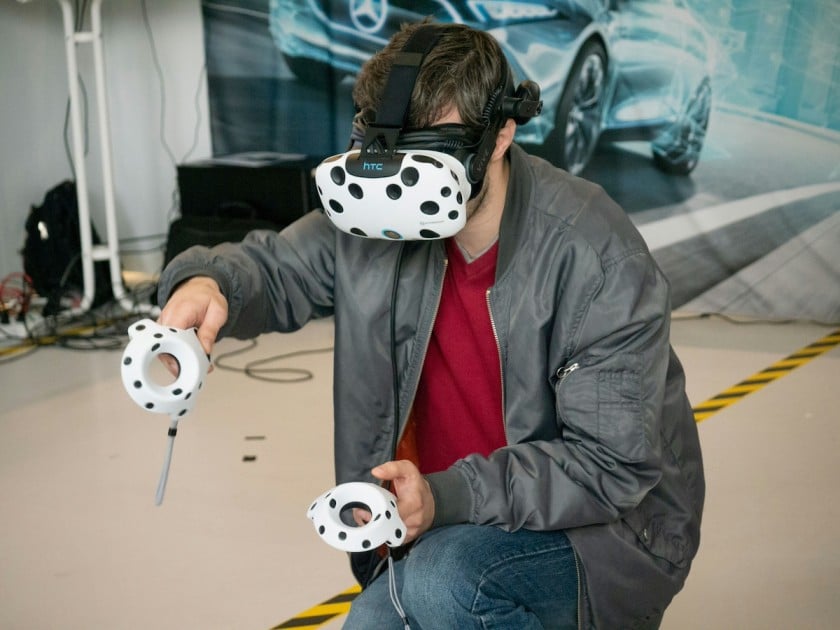
The combination of virtual reality and augmented reality in events is more than a trend-it’s becoming a standard expectation. Organisers increasingly use these tools to stand out in a crowded marketplace and deliver experiences that are:
- Engaging: Virtual environments keep audiences immersed and attentive.
- Customisable: Different attendee groups can experience tailored content.
- Scalable: Events in VR or AR can host thousands of participants globally.
This rise of virtual reality in the events industry is opening new doors for recruitment, compliance, and talent training, areas where staffing platforms like Liveforce can provide support.New Possibilities for the Events Industry.
The Role of Event Staffing in VR, AR, and Hybrid Events
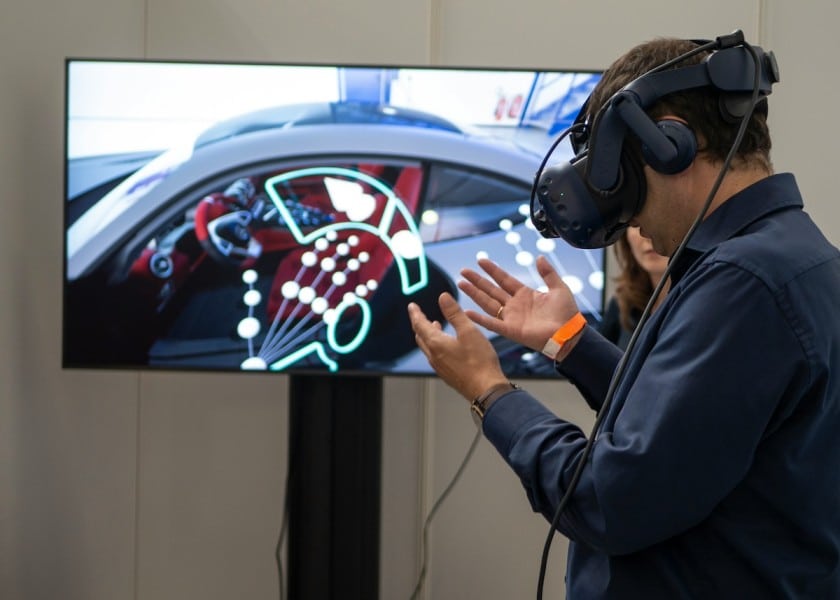
Technology alone doesn’t guarantee success. Skilled, adaptable staff remain essential. As demand for VR events and augmented reality at events grows, staffing agencies must focus on equipping workers with new skills.
New Skills and Training
Event staff now need to be proficient in:
- Managing VR headsets and AR apps.
- Supporting hybrid streaming technology.
- Providing technical assistance during virtual sessions.
For staffing agencies, offering access to a talent management database that tracks training and certifications ensures reliable placements.
Versatile Roles in the New Event Landscape
The rise of events in virtual reality and AR requires staff for roles such as:
- VR content managers and moderators.
- Technical support teams for hybrid platforms.
- Virtual hosts facilitating digital networking.
Agencies that build flexible, multi-skilled teams will be well-positioned to meet growing demand.
Enhanced Engagement and Attendee Experience
Staffing plays a critical role in creating meaningful connections between physical and digital audiences.
Trained workers help:
- Guide attendees through VR environments.
- Facilitate AR-powered product demonstrations.
- Manage real-time communication across hybrid platforms.
Well-trained staff can guide audiences through augmented reality at events, ensuring that interactive elements run smoothly and add value.
Key Benefits of VR and AR in Events
The adoption of virtual reality in event management and the wider use of virtual reality in the events industry bring measurable benefits for both organisers and attendees.
1. Global Reach
Events powered by VR can reach audiences anywhere, removing geographical barriers and expanding client bases.
2. Cost-Effectiveness
Hosting parts of events virtually reduces venue and travel costs. Organisers can allocate budgets more efficiently, focusing on high-value experiences.
3. Sustainability
Hybrid and virtual formats help reduce carbon footprints by minimizing travel and the use of physical materials. This aligns with the sustainability goals of many organisations.
4. Improved Engagement
Interactive VR content for events boosts attendee participation, making sessions more memorable and impactful.
The adoption of virtual reality in events industry practices shows how organisers are shifting focus toward innovation and measurable outcomes.
Measuring ROI of VR and AR in Events
One of the biggest questions for organisers is whether virtual reality (VR) and augmented reality (AR) activations are truly worth the investment.
While these technologies bring excitement and novelty, event managers need to demonstrate measurable returns. ROI, however, is not just about cost savings – it’s also about engagement, lead generation, and long-term brand impact.
Key ROI Metrics for VR and AR Activations
To evaluate success, organisers can track a variety of ROI indicators:
- Attendee Engagement – VR and AR naturally capture attention. Metrics such as dwell time at booths, the number of headset uses, or repeat participation in VR apps reveal how immersive experiences keep audiences involved longer than traditional formats.
- Lead Generation – VR simulations or AR activations often provide opportunities to capture valuable attendee data. Tracking sign-ups, product demo requests, or contact details submitted during these experiences highlights their role in the sales funnel.
- Brand Visibility – AR filters and immersive VR activations create highly shareable content. Social mentions, user-generated videos, and branded hashtags can significantly amplify event reach beyond the physical venue.
- Training Efficiency – For hybrid events, VR training modules can reduce costs and time compared to in-person onboarding. Agencies can compare training completion rates, knowledge retention, and savings on travel or venue hire.
- Sustainability Impact – As hybrid event trends grow, VR and AR reduce the need for physical resources and long-distance travel. This not only lowers costs but also aligns with sustainability goals increasingly valued by clients and attendees.
Connecting ROI to Staffing
The potential ROI of VR and AR activations is maximised when supported by efficient staffing. Skilled staff are needed to manage equipment, guide attendees, and troubleshoot technical issues. This is where Liveforce helps.
By offering tools to schedule, track performance, and manage staff compliance, agencies can ensure VR and AR activations run smoothly and deliver measurable business results.
With the right planning, technology, and staffing infrastructure, VR and AR become more than innovative experiences – they become investments that deliver clear and lasting returns.
How Liveforce Fits into the Latest Trends in VR, AR, and Hybrid Events
Liveforce is perfectly positioned to support the evolving needs of the events industry as VR, AR, and hybrid events continue to grow. Here’s how Liveforce can help:
Efficient Staff Management
Liveforce streamlines the process of managing event staff, whether they are working on-site or remotely. The platform allows organisers to schedule staff, assign roles, and communicate effectively, ensuring everyone is on the same page.
Skill Matching and Training
With Liveforce, you can maintain a detailed database of staff skills and training. This makes it easier to match staff with the appropriate roles for VR, AR, and hybrid events. Additionally, Liveforce can help track training progress, ensuring your team is up-to-date with the latest technologies.
Real-Time Communication
Effective communication is crucial for the success of any event. Liveforce facilitates real-time communication between organisers and staff, allowing for quick updates and issue resolution. This is particularly important for hybrid events, where seamless coordination between in-person and remote teams is essential.
Feedback and Improvement
Collecting feedback is vital for continuous improvement. Liveforce provides tools for gathering feedback from both staff and attendees, helping you identify areas for improvement and enhance future events.
What to Consider When Managing VR and Hybrid Events
Running VR events or hybrid experiences requires more than just the right technology. Successful delivery depends on careful planning, skilled staff, and systems that keep everything connected. When preparing for VR and AR events, event organisers should focus on:
- Scheduling flexibility – VR and hybrid events often involve last-minute changes. Having tools and processes in place to adapt quickly is crucial.
- Staff training and readiness – Ensure your team is equipped with the technical skills to manage VR headsets, AR apps, and hybrid platforms.
- Compliance and security – Protect attendee data and make sure staff meet any necessary training or safety requirements.
- Mobile accessibility – Event managers need visibility on the go. Access to schedules, staff profiles, and real-time updates from a mobile device is essential.
- Integration with event platforms – Hybrid events often rely on multiple systems. Look for ways to ensure smooth coordination between staffing, streaming, and engagement tools.
By addressing these considerations, agencies and organisers can reduce risk, improve attendee satisfaction, and create truly memorable event experiences.
AR, VR and Hybrid Event Success with Liveforce

The integration of virtual reality in events and the growth of AR and hybrid formats are transforming the events industry. From global reach and cost savings to enhanced engagement, these technologies are here to stay.
The combined use of virtual reality and augmented reality in events ensures that audiences can engage more deeply, no matter where they are.
Event organisers and staffing agencies that embrace innovation and equip their teams with the right skills will remain competitive. Keeping pace with hybrid events trends will allow organisers to stay competitive and meet evolving audience expectations.
With tools like Liveforce, agencies can manage staff efficiently, ensure compliance, and deliver outstanding VR, AR, and hybrid event experiences.
FAQs
It refers to the use of VR technology to create immersive experiences such as virtual conferences, product demos, or concerts, allowing global participation.
AR is used to overlay digital elements in real-world settings, making exhibitions, activations, and presentations more interactive. Increasingly, we see the integration of AR and VR in events, combining immersive experiences with interactive, real-time participation.
Key benefits include global reach, reduced costs, improved sustainability, and higher attendee engagement through immersive experiences.
Hybrid events combine in-person and virtual participation, allowing greater flexibility, scalability, and access for diverse audiences.
Trained staff ensure smooth delivery, assist attendees with technology, and manage hybrid platforms-bridging the gap between digital tools and human connection.
VR is used for training, networking, and large-scale conferences. Increasingly, the combination of virtual reality and augmented reality in events is shaping how audiences engage and how organisers deliver value.
The benefits of using augmented reality at events include more memorable product demos, stronger audience engagement, and a modern, tech-driven brand presence.

